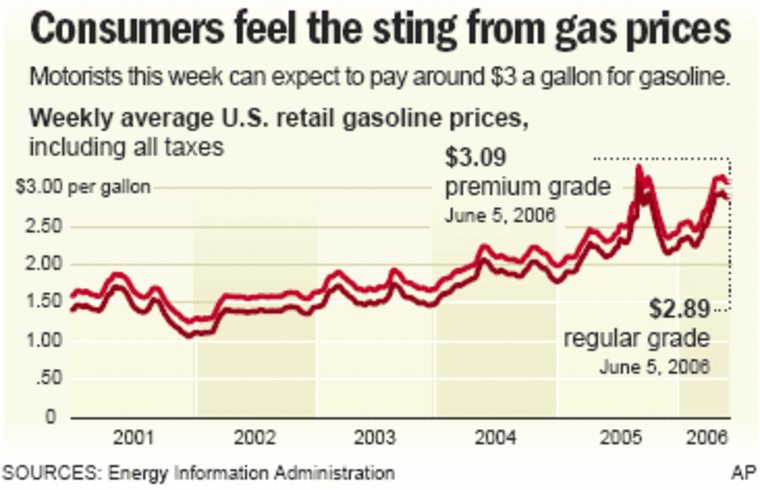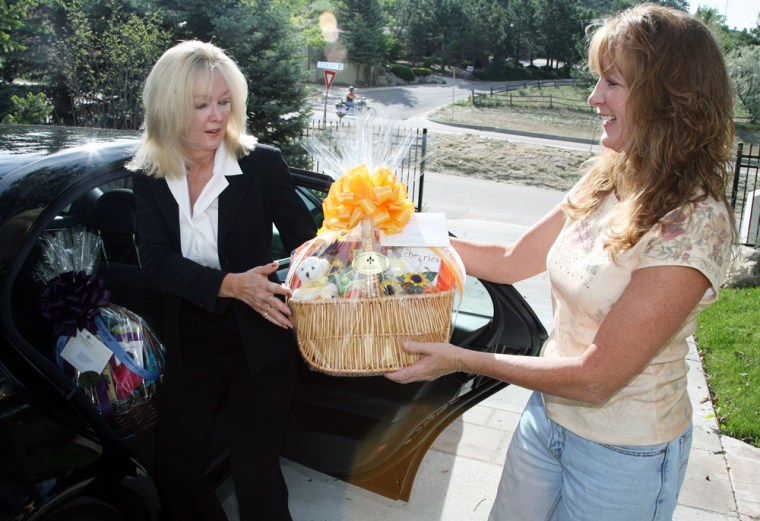Fast delivery and same-day service, two favorite ways for small businesses to build relationships with customers, are becoming casualties of higher gas prices.
Some small companies that until recently sent their vans or trucks on several runs a day have been forced to cut back, sometimes to just one. Their customers, meanwhile, have to wait longer, or if they’re in a rush, take their business elsewhere.
It’s a painful turn, especially when deliveries, a component of customer service, are also a fundamental part of a business itself.
Karen Ross, who owns Montgomery’s Florist in Raleigh, N.C., has had to limit deliveries to customers in several nearby cities, among them Cary, 15 miles away.
“We used to go in the morning and afternoon. People were just used to that, being able to call and have morning delivery,” Ross said. Now, however, her vans deliver to those cities only in the afternoon.
“We lost some business there,” Ross said. While customers generally understand the situation, those who need flowers delivered by 1 p.m. end up calling another florist.
But that’s just part of the sting that Ross and her customers are feeling because of gasoline that’s hovering around $3 a gallon. With her two Ford vans now costing $75 to fill up, Ross has had to raise her delivery charge to $12 from $8.50, a more than 40 percent increase.

“Sometimes they’ll say, ’Wow, that’s a lot,”’ Ross said. But when we explain ... they always understand.”
Businesses across the country have been forced to cope for more than a year with higher fuel prices, not just for their own deliveries, but for shipments of supplies and raw materials they receive. And higher energy costs are driving up the prices of the goods themselves.
But the impact isn’t just on profits — owners are aware that fewer or later deliveries along with higher delivery charges are chipping away at the customer service they have long prided themselves on.
Cynthia McKay is struggling with that issue in her Castle Rock, Colo.-based business, Le Gourmet Gift Basket Inc.
“We are known for last-minute deliveries,” McKay said, explaining, “that’s been a lot to do with dropping everything and getting the basket out when we need it for corporate clients.”
But with gas prices climbing, “our delivery people can’t afford to do it anymore,” she said.
McKay’s situation is complicated by the fact that she hires independent contractors for her deliveries. These are people who make their money doing deliveries for other people, using their own vehicles and paying for gas themselves. As business owners themselves, they have to cut their costs by consolidating the number of deliveries they make; they’re not willing to handle McKay’s eleventh-hour orders if they don’t have other deliveries to make at the same time or in the same area.
McKay’s contractors are also charging her more for all the deliveries they make, and last month, she passed along a 15 percent increase to her customers. “We waited as long as we could” before imposing the increase, she said.
Many business owners try to offset the decline in service by giving some kind of discount or adding some value for customers. McKay said she’s upgraded the quality of merchandise that goes into the gift baskets.
“Since I’m buying wholesale, they get more for their money,” she said. And sometimes, depending on the customer, she might get a rush job delivered, even if it means absorbing the higher charges.
But, like Ross, sometimes she’ll just lose a sale.
“It can’t compete with time,” McKay said of the extras. “There’s only so much we can do.”
Hal Smith, who owns the Tacoma, Wash., franchise for 1-800-GOT-JUNK?, said his customer service has also been affected. He can’t afford to have both of his big trucks on the road at one time if business isn’t brisk enough, so customers may not always be able to get pickups at the exact times they want.
“It limits the customer more than I’d like,” said Smith, whose business collects all sorts of unwanted items from homeowners and businesses. Still, Smith said, if a customer desperately needs a pickup, “I will accommodate them.”
Smith said higher fuel prices are actually having a bigger impact on his ability to market himself. When gas was cheaper, he would send his trucks out in a caravan; they were very eye-catching.
“Our biggest compliment was, ’We saw your trucks everywhere,”’ Smith said. He said he’s now using more traditional direct marketing to try to make his company’s name more visible.
He’s also had to cut back on a community service that was very important to him: taking recycled materials to thrift shops. The higher cost of fuel makes it too expensive to make the trip.
“The thrift store’s way out of our way, not on the way to the dump,” Smith said. “We’re not being able to kick back to the community the way we have in the past.”
